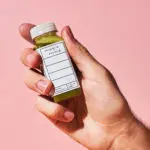
Algae extracts for animal feed are a promising ingredient, derived from algae and offering numerous health benefits for animals. These extracts can be used in various animal feed products, especially in the premium segment, to improve the nutritional composition and promote animal health.
What are algae extracts?
Algae extracts are products derived from algae that can be used in various industries and applications, including food, cosmetics, pharmaceuticals but also in the animal feed industry.
These extracts can contain various bioactive compounds from algae, which are interesting due to their potential health benefits and versatile applications. The extraction of algae can be done in different ways and the final product can be in the form of powder or liquid, depending on the requirements of the application.
The choice of end product depends on several factors, including the intended application, the stability of the bioactive compounds and the processing requirements. Powdered algal extracts are often easier to handle and store, while liquid extracts may be better incorporated into certain products. A good example of an algal extract that comes in both forms is Phycocyanin powder and Phycocyanin tincture.
What advantages do algae extracts for animal feed have over normal algae products such as powder?
Algae extracts offer several advantages over normal algae products such as conventional algae powder. These advantages are due to several factors, both in terms of application possibilities and shelf life.
Extracts can offer more stable forms of the bioactive compounds that are less susceptible to degradation, especially in light, heat or oxygen. This increases the shelf life of the products compared to the raw materials from which they were extracted. An example of this beyond algae extracts is seawater extract, which understandably has a more stable form compared to pure seawater.
Algae extracts are often produced by specialised extraction processes in which the bioactive compounds from the algae are concentrated. As a result, the amount of desired active ingredients in algae extracts is often higher compared to algae powders. This allows for more efficient use in various applications. A good example is DHA, which is extracted from the microalgae Schizochytrium sp. among others.
Algae extracts can offer better bioavailability because the bioactive compounds are in a form that can be more easily absorbed by the body. This is particularly important in the pharmaceutical and dietary supplement industries, but also in the animal feed industry, where the efficacy of the products plays a crucial role. One example is Astaxanthin, which is extracted from the microalgae Haematococcus pluvialis.
Liquid algae extracts are often easier to incorporate into different product formulations, which applies not only to the food industry but also to animal feed. This allows manufacturers greater flexibility in the design of end products. A good example of a high-quality liquid extract is Phycocyanin tincture.
Algae extracts can be precisely dosed to ensure the desired amount of bioactive compounds. This is of great importance to ensure the efficacy and safety of the products. For example, it is easier to include extracted Fucoidan powder in animal feed than to use brown algae powder, where the Fucoidan content is more difficult to determine and dose.
What can algae extracts do in animal feed?
Algae extracts can have various beneficial effects in animal feed, both for supplementation and for deficiency correction, depending on the specific needs of the animals and the properties of the extract.
Algae are rich in various nutrients such as vitamins, minerals, amino acids and especially in specific, extraordinary bioactive substances that are found in relevant quantities almost exclusively in algae. A concise example of this is Astaxanthin powder. The addition of algae extracts can help to improve the nutrient composition of animal feed and compensate for possible nutrient deficiencies. Specifically, Astaxanthin supports cognitive processes and in maintaining normal brain function as we age.
Certain algae extracts may contain bioactive compounds that can provide health benefits. For example, algae extracts with antioxidants can support immune function and protect animals from oxidative stress, as is the case with Phycocyanin powder extracted from Spirulina platensis.
For which types of animals are algae extract for animal feed suitable?
Algae extracts can be used in different types of animal feed for a wide range of animals. The suitability of algae extracts depends on the specific needs and nutritional requirements of the animals.
In the field of domestic animal husbandry, algae extracts are suitable for fish, among others. Algae extracts are a valuable source of omega-3 fatty acids, especially DHA from Schizochytrium sp. and EPA from Nannochloropsis sp., which are essential for the health of fish, especially in aquaculture. They can help to increase the omega-3 fatty acids in the feed of farmed fish. But the colouring of the animals can also be supported with the addition of beta-carotene from Dunaliella salina.
Algae extracts can also be used in pet food for dogs and cats. They can help support skin and coat health and provide important nutrients. For example, Spirulina platensis is already used in dog and cat food for its high Phycocyanin content to actively support the immune system. Fucoidan powder, extracted from brown algae, can additionally be integrated well into dog food to support health even in old age. Several studies show tendencies that Fucoidan actively inhibits the formation and spread of abnormal cells.
In horse feeding, algae extracts can help to optimise the supply of micronutrients and promote the general health of the animals. Especially for horses competing, algae and algae extracts are used to promote recovery. Similar to dogs and cats, people are already turning to Spirulina platensis powder that is as concentrated as possible.
Not only pets can benefit from algae extracts, but also farm animals. In poultry farming, algae extracts can help support digestive health as well as the immune system and increase feed intake. They can also serve as a source of important nutrients and vitamins.
Algae extracts can also offer functional solutions for farm animals. Ulva lactuca, for example, offers benefits for the digestion of farm animals. It contains active substances (Ulvan) that stimulate mucin production, thus strengthening the protective mucus layer in the intestine and reducing the transmission of pathogens. Ulvans also regulate liver metabolism and the bile acid cycle, support digestion and prevent metabolic disorders such as ketosis in dairy cows.
How can algae extracts be integrated into animal feed?
Integrating algae extracts into animal feed requires careful planning and dosing to ensure that the specific needs of the animals are met and feed quality is improved. Fortunately, the form of algae extracts, i.e. powder and liquid form, makes this relatively easy to achieve.
Powdered algae extracts can be included in the formulation of pellets or granules for animal feed. These forms are stable and easy to handle, and the extracts can be evenly incorporated into the feed particles. However, the algae extract powder can also simply be added to the animal feed.
Liquid algae extracts such as Astaxanthin oleoresin from Haematococcus pluvialis and Phycocyanin tincture can be stirred directly into the liquid feed for animals. This allows algae extracts to be efficiently incorporated into the manufacture of animal feed products. However, consideration should also be given to how the extracts are processed and whether microencapsulation is required or the processing method is suitable without encapsulation.
For which segment of animal feed products are algae extracts suitable?
Algae extracts are particularly suitable for animal feed products in the premium segment. Since the production of algae extracts is usually more complex compared to conventional feeds and requires the extraction of high-quality bioactive compounds, they tend to be more expensive. Therefore, they can be used in premium pet food products aimed at pet owners who are willing to spend more money on high-quality products.
Especially products for pets fall into this segment. Pet owners who have high demands on the health and well-being of their pets are often willing to invest in premium pet food products and preventive pet supplements. This applies in particular to dogs and cats, but also to horses that are not primarily kept as farm animals. However, the aquaculture industry should not be underestimated. It is often important for animal keepers to support the splendid colouring of the fish, which can be done well with algae extracts.
Algae extracts – whether solid or liquid, a good choice for the animal
Overall, algae extracts, whether in solid or liquid form, offer a highly versatile and beneficial choice for making animal feed mixtures. Their concentration of bioactive compounds and nutrients makes them an asset to animal feeds, while their adaptability to different processing methods allows them to be integrated into a wide range of animal feed products, especially in premium product segments.
From improving nutrient composition to promoting animal health and well-being, algae extracts offer an attractive solution for pet owners and producers seeking only the best for their animals.
Sources
https://www.ncbi.nlm.nih.gov/pubmed/22510492
https://www.ncbi.nlm.nih.gov/pubmed/25854641
https://www.ncbi.nlm.nih.gov/pubmed/26241708
https://www.dairyglobal.net/general/the-use-of-seaweed-extract-in-cattle-feed/#:~:text=In%20conclusion%2C%20the%20use%20of,reduce%20immunodepression%20in%20dairy%20production
https://www.olmix.com/de/animal-care
https://pubmed.ncbi.nlm.nih.gov/34189658/







Comments by Pit Wagner